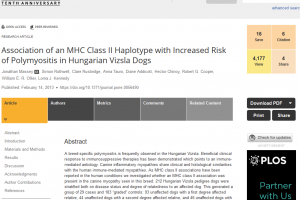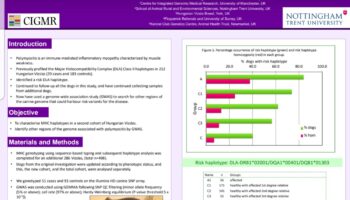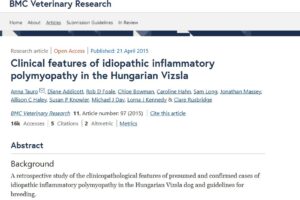Research
The purpose of the research thus far has been to identify the genetic mutations associated with Vizsla Inflammatory Polymyopathy (VIP). The hope is to develop a screening test to better inform breeders of the potential risk of producing affected puppies
Since 2011 we have been collecting vizsla DNA samples – from VIP affected dogs, close relatives and graded controls. Saliva is collected via Performagene swab kits– which yield high quality DNA with excellent viability
In 2013 a Genetics Paper was published that identified a MHC Class ll haplotype associated with an increased risk of Vizsla Polymyositis. This was an exciting finding, raising hope of one day developing a screening test.
Click on the images to read the Articles
To that end our work has continued After publication we continued to submit saliva samples from affected dogs and graded controls. Until 2020 the dataset grew to comprise c 530 dogs. Lorna Kennedy and her team at CIGMR (Manchester University) extracted DNA and DLA typed most of these samples. Further analysis of the updated data confirmed an increased significance for all the previously published associations. In terms of validation this was very encouraging and the plan was to proceed to yet further interrogation of the information provided on the SNP arrays.
The work suffered considerable setback as a result of Covid and then with the closure of the Animal Health Trust, with whom we were collaborating. A further blow was the University of Manchester’s cessation of funding to the CIGMR myositis project
UPDATE 2024
After much discussion there are now advanced plans for the vizsla samples, and associated data, to be transferred from Manchester to the Kennel Club Genetics Centre, at Cambridge University. It has been the hugest relief that the work over the last 10+ years will not be lost
Collection of samples from affected dogs has now restarted but it may take a while for the project to regain good momentum. We must remain hopeful that the research will properly resume and are determined to be ready to support it with further funding
To this end we would be so very grateful for financial help
*the wider context*
The current research into VIP has the potential to help human sufferers of myositis – and indeed other inheritable inflammatory disorders. Pedigree dog breeds that display high predisposition for certain spontaneously occurring diseases have already proved to represent a powerful comparative genetic model for aiding in the discovery of novel genetic loci underlying analogous human conditions.




